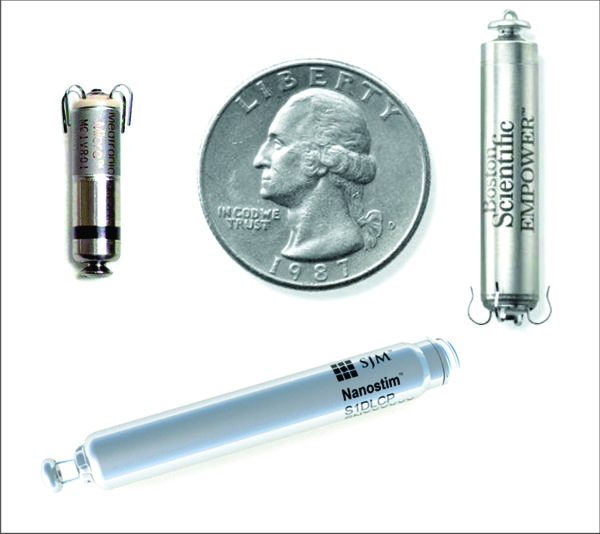
Medtronic Micra™, Boston Scientific Empower™, and St Jude (Abbott) Nanostim™. Scale is approximate
I just came back from HRS 2019 in SF, and the implantable devices buzz this year was around leadless pacemakers and defibrillators. Most importantly, they are no longer considered a technical curiosity, but rather are entering the mainstream as a serious alternative to leaded devices.
In the bradycardia field, Medtronic showed how their MICRA™- the only commercially-available leadless pacemaker at this time – is able to pace the ventricle in sequence with the atrium through the use of a 3D accelerometer that senses the atrial contraction.
Researchers using the Boston Scientific EMPOWER™ Modular Pacing System showed how it can communicate with Boston’s EMBLEM™ S-ICD System to provide brady and ATP pacing.
On its side, Abbott is said to be working to relaunch the plagued NANOSTIM™ leadless pacemaker after early battery depletion issues caused St. Jude to issue an advisory in October 2016, followed by Abbott maintaining the worldwide halt on implantations because of problems with the device’s docking button.
More mention is also being made of EBR’s LV pacemakers as an alternative to GCV leads to deliver CRT.

EBR’s WISE wireless LV pacemaker is powered from an ultrasonic generator implanted outside the heart.
On the leadless (or at least without leads implanted in the vasculature) ICD side, Boston Scientific remains the only commercially-available device with its EMBLEM™ S-ICD System, which has shown strong clinical success. However, Medtronic was touting the results of its Extravascular Implantable Cardioverter Defibrillator (EV ICD), which uses a lead placed under the sternum.
The EV ICD gets the electrodes much closer to the heart than Boston Scientific’s subcutaneous lead, enabling the ICD to deliver painless pacing and ATP therapy.
Also on the topic of leadless defibrillators, NewPace Medical had a booth showing a mockup of its proposed “Implantable Subcutaneous String Defibrillator” (ISSD™). The device was mentioned in passing by Dr. Neuzil from the Czech Republic, who conducted the acute study on the electrode configuration. I asked NewPace’s CEO Gera Strommer when could we expect to see first implants of this device, to which he responded “it will depend on the financial situation.”
